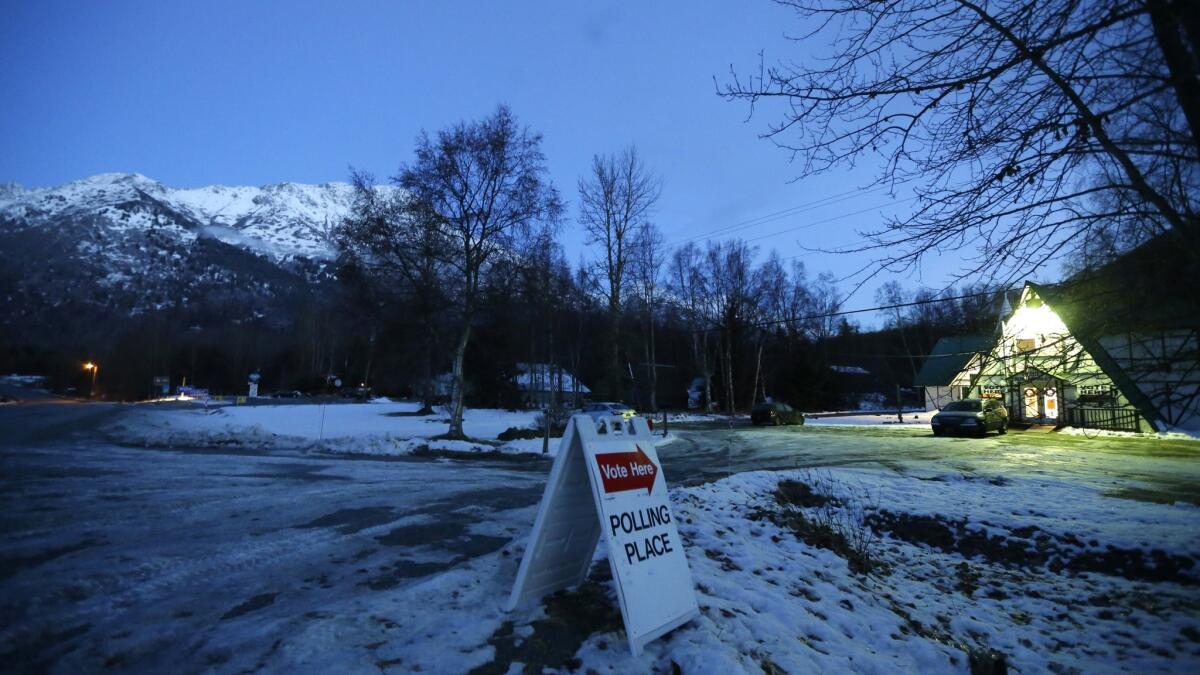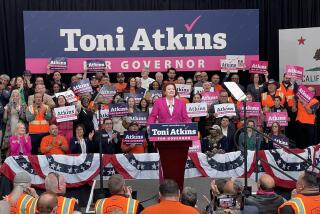Alaska: Senate, governor’s races too close to call

Alaska Democratic Sen. Mark Begich trailed Republican challenger Dan Sullivan late Tuesday after a fierce campaign dominated by millions in spending by outside groups and Begich’s determined efforts to distance himself from President Obama. But Begich insisted he would hang in for a week or more.
With nearly 74% of the precincts reporting, Begich had 44.1% to Sullivan’s 50%.
But Begich noted that he trailed on election night in 2008 too, and eventually defeated incumbent Ted Stevens when all the votes were counted.
“We’ve seen this play before,” Begich told supporters. “It’s gonna be a long night. It might be a long week.… I’ll take a win however it comes.”
Absentee ballots must be received by Nov. 14, and officials have until Nov. 19 to count them.
The governor’s race was also likely to depend on the outstanding absentee ballots. Gov. Sean Parnell narrowly trailed, with 46.8% to challenger Bill Walker’s 47.7%.
Early in the race, Parnell was viewed as likely to win, but two developments ate away at his chances.
After the primaries in late August, Parnell faced two opponents: Walker, a former Republican running this time as an Independent, and Democrat Byron Mallott. But Walker and Mallott realized they were both destined to lose a three-way race, so they joined forces. Not long after Labor Day, the Walker-Mallott unity ticket was unveiled.
Parnell was also hurt by the daily drumbeat of bad press about a wide sexual abuse scandal in the Alaska National Guard, of which the governor is commander in chief.
Allegations of sexual assault and official stonewalling in the Guard were first reported in the Anchorage Daily News a year ago, when a group of Guard chaplains disclosed that victims of sexual assault had been coming to them for years.
Many of the women said they had been raped by fellow Guard members. Some said they had been drugged and assaulted. The chaplains said they reported the allegations to Parnell in 2010, but nothing resulted from their conversations.
A scathing, 229-page report by the National Guard Bureau Office of Complex Investigations released in September found that complaints by some sexual assault victims before 2012 were not properly documented, that victims were not referred to victim advocates, that their confidentiality was breached and that, “in some cases, the victims were ostracized by their leaders, peers and units.”
Parnell spent the last two months of the campaign defending his actions in the spreading scandal.
In the Senate race, Sullivan, a former state attorney general, spent months attacking Begich as a tool of the Obama administration, a senator who voted with the president “97% of the time” and who cast the deciding ballot in favor of the Affordable Care Act.
For his part, Begich rarely uttered the president’s name unless prompted by a voter at a campaign event. But he told anyone who would listen that he voted with his Republican counterpart Sen. Lisa Murkowski “80% of the time.”
And about that deciding Obamacare vote? Begich had a tart response, telling Republican challengers that “every senator was the 60th” deciding vote if that senator was an incumbent Democrat.
“I was No. 6 in the vote, if you want to be technical about it,” Begich said at a town hall meeting in the waning weeks of the campaign. “Because it’s a role call vote. A. B. C. I was No. 6.”
The race was the most expensive in Alaska history, with more than $40 million in outside spending alone, because it was one of a handful viewed as crucial in deciding control of the U.S. Senate.
But for all its political star turn in 2014, the results ended up mattering largely in Alaska. Before the polls even closed in the Last Frontier, the Senate had already gone over to Republican hands.
More to Read
Get the L.A. Times Politics newsletter
Deeply reported insights into legislation, politics and policy from Sacramento, Washington and beyond. In your inbox three times per week.
You may occasionally receive promotional content from the Los Angeles Times.







